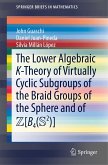A fundamental object of study in group theory is the lower central series of groups. Understanding its relationship with the dimension series, which consists of the subgroups determined by the augmentation powers, is a challenging task. This monograph presents an exposition of different methods for investigating this relationship. In addition to group theorists, the results are also of interest to topologists and number theorists. The approach is mainly combinatorial and homological. A novel feature is an exposition of simplicial methods for the study of problems in group theory.
From the reviews:
"The authors of this book present an exposition of different methods related to the theory of the lower central series of groups, the dimension subgroups, the augmentation powers and the derived series. ... This book is very useful for future investigations of the lower central series of groups and the dimension subgroups." (Todor Mollov, Zentralblatt MATH, Vol. 1157, 2009)
"The focus is primarily on homological, homotopical and combinatorial methods for the study of group rings. ... On the whole, the monograph is a welcome addition for those interested in the various aspects of the study of group rings and their applications. A strong point of the present book ... is the numerous examples given in each chapter either to confirm a certain result or as a counterexample of a result under weaker hypothesis." (L. R. Vermani, Mathematical Reviews, Issue 2009 m)
"The authors of this book present an exposition of different methods related to the theory of the lower central series of groups, the dimension subgroups, the augmentation powers and the derived series. ... This book is very useful for future investigations of the lower central series of groups and the dimension subgroups." (Todor Mollov, Zentralblatt MATH, Vol. 1157, 2009)
"The focus is primarily on homological, homotopical and combinatorial methods for the study of group rings. ... On the whole, the monograph is a welcome addition for those interested in the various aspects of the study of group rings and their applications. A strong point of the present book ... is the numerous examples given in each chapter either to confirm a certain result or as a counterexample of a result under weaker hypothesis." (L. R. Vermani, Mathematical Reviews, Issue 2009 m)








